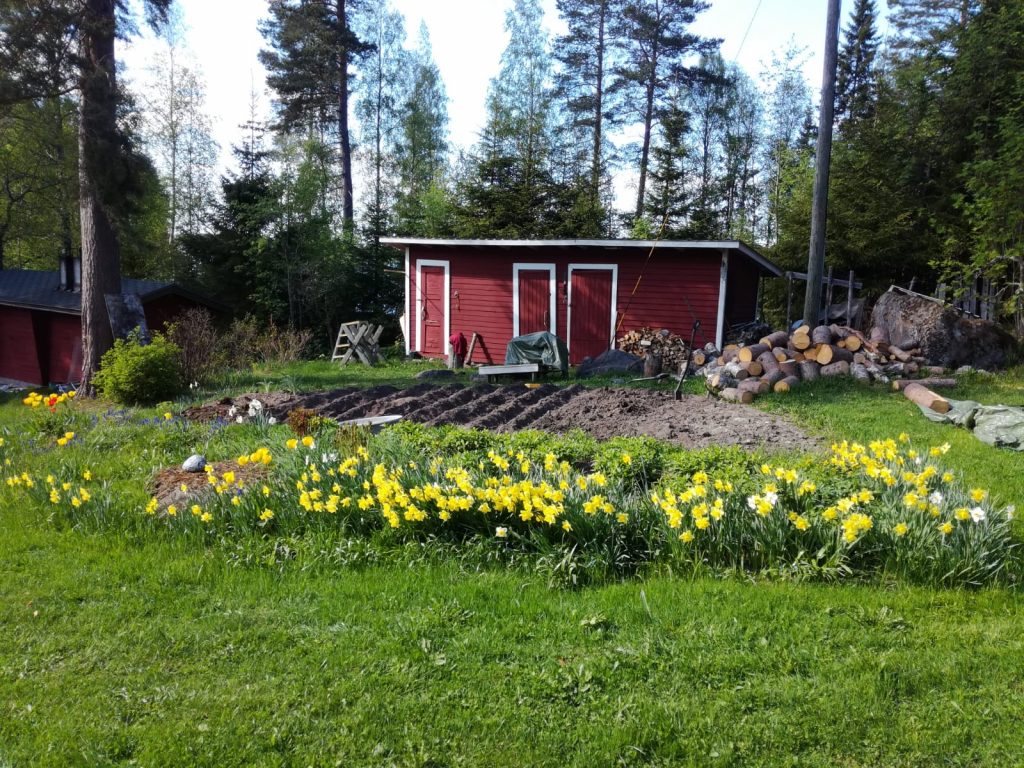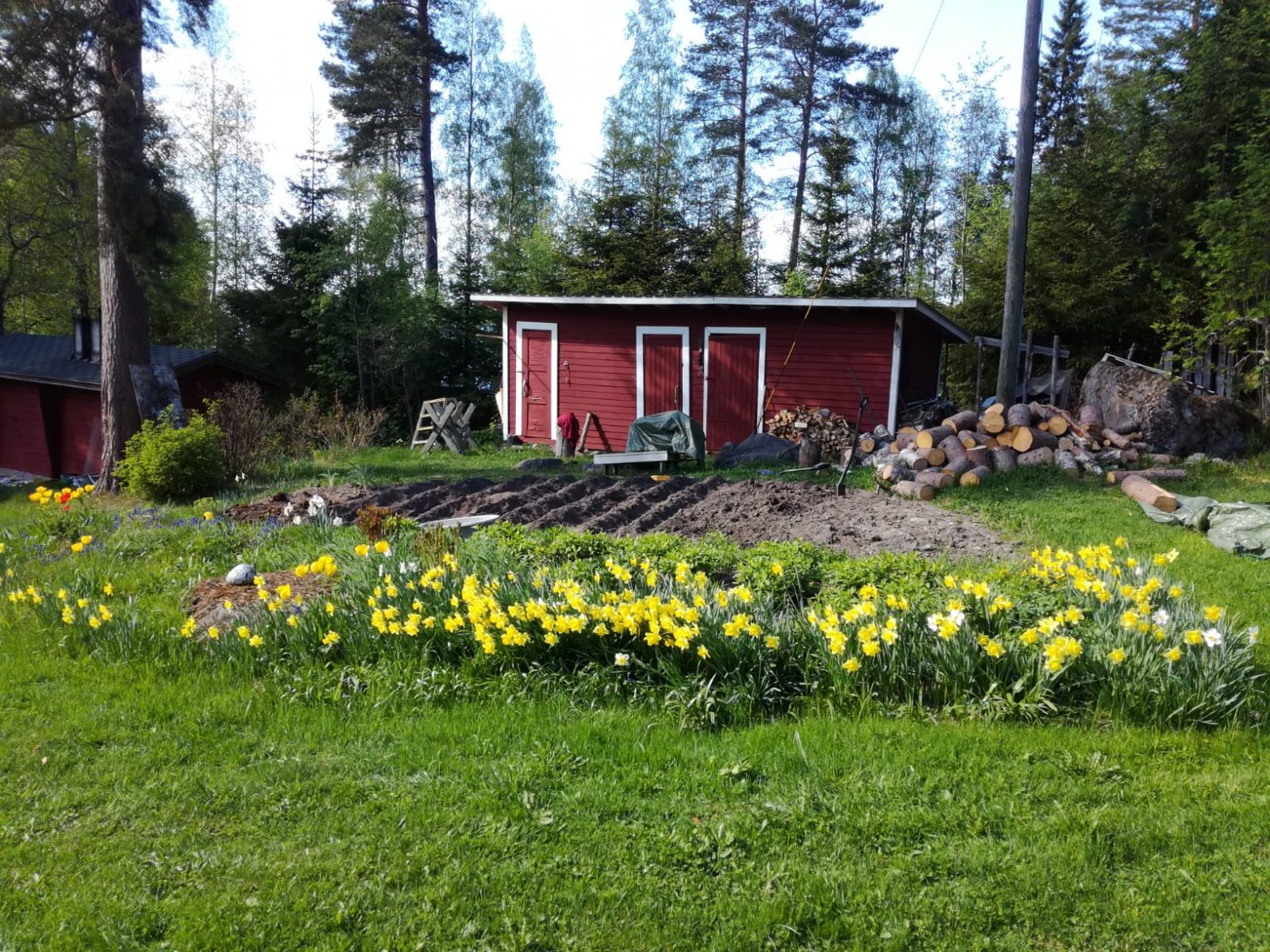Large-scale industrial food production has been identified as a cause of environmental havoc. Growing and gathering one’s own food—or food self-provisioning—has again been proposed as a sustainable alternative. Owing to its small scale, local food self-provisioning requires less clear cutting of forests, mining for rare minerals, development of new chemicals, or resource intensive transportation infrastructure than larger scale systems of food provisioning. Food self-provisioning is also strongly interlinked with other concerns of sustainability at the community level, such as energy production, housing, commuting, livelihoods, services, and demographics.
Many people in Finland have had experiences in small-scale food provisioning, such as community gardening, balcony plantations, picking berries and mushrooms, hunting, or fishing. The Sámi communities in the North even hold a rich variety of skills and knowledge needed for a subsistence economy. As the planetary crises call for reducing the overall amount of production and consumption and increasing their quality (e.g., by radically cutting down the use of fossil fuels), small-scale practices at the fringe disclose as a prominent alternative, but also beg us to question the viability of this alternative from social and environmental point of views. How feasible is it to think that such marginal practices can be mainstreamed by recruiting modern citizens and stakeholders in the small-scale self-provisioning of food and other goods, such as construction materials, energy, and clothing? What sort of skills are needed in making this kind of transformation towards self-provisioning conceivable and possible?
Cultivating the skills of food self-provisioning
In the autumn of 2021, Process Studies on Sustainable Economy (PROSE) at the Faculty of Agriculture and Forestry, Department of Economics and Management, launched an Academy of Finland research project to study food self-provisioning in rural communities in Finland. The project approaches self-provisioning as a set of social practices, referring to actions in space-time evolving around practical understandings, including skills and know-how. In its simplest, our focus is on ‘doings’ rather than ‘sayings’ of self-previsioning. From this perspective, the practices, and skills of food self-provisioning develop in relation to the competencies, bodies, and places where food production occurs. This complements, as well as somewhat challenges, the rather conventional view of skills as technical capabilities. The skills of self-provisioning are not only something that human individuals possess, but something that unfolds in the situational interaction and cooperation between humans and between humans and non-humans, like tools, domesticated animals, plants, and the soil.
In Finland, there are relevant ongoing initiatives to teach the skills of self-provisioning to the wider community. One such initiative is Omavaraopisto, a combination of a pedagogical self-sufficiency institute and an ecovillage, situated in Nurmes in Eastern Finland, and launched in 2021. The institute has an explicit pedagogical goal to develop skills related to food and community self-sufficiency, such as learning how to produce food using minimum amount of manual labor without the help of machinery (e.g., power tools) or animals to minimize individual workload and the impact on ecosystems. The school aims to provide a broad range of knowledge and guidance for people interested in a self-sufficient and artisanal way of life. Teaching focuses on practices related to food production, and their interdependencies regarding production technologies, energy consumption, infrastructure, building practices and socio-ecological sustainability. Students interested in such skills related to sufficiency are invited to join the school for a fixed period (e.g., a six-month program) and to take the lessons learnt back to their own communities.
Food self-provisioning may also become a sustainability initiative at a regional administrative level. Sodankylä is an example of a municipality that has a well-established strategy of pursuing self-provisioning in food production and other municipal functions. Consecutive municipal strategies in Sodankylä have highlighted values of environmental, social, and economic sustainability in the development of the municipality’s economic sectors and functions. A prime example of such development is the innovation and reorganization of the municipal food services along the principles of locally grounded socio-ecological sufficiency and sustainability. The municipal central kitchen, which prepares all municipal meals (c. 1500 lunches per day), sources its ingredients from local producers by deliberately splitting procurement into sufficiently small offers for local producers to supply. Instead of semi-finished products, the kitchen uses local unprocessed raw ingredients and prepares all food on the spot. Their practices are claimed to save energy, costs, and the environment, tying in with the municipality’s overall strategy to reduce external resource dependency, build resilience and community viability – and adhere to the principles of circular economy at the municipal level, for example in terms of utilization of natural resources, raw materials, side streams, logistics and energy.

Food self-provisioning as part of social and ecological resilience
On the one hand, food self-provisioning can be perceived as a crucial part of socio-ecological resilience as it entails an enhanced ability to cope in times of crises through securing a source of nutrition for communities. On the other hand, space-specificity makes food self-provisioning vulnerable to extreme events, such as drought, fires, floods, storms, and disease outbreaks, which are likely to become more common in future. Nevertheless, communities adopting a variety of means to produce and preserve food, as well as those that manage to collaborate and share resources, skills, and knowledge with their neighboring communities, may prove more resilient in times of crisis. Properly functioning social relations (of meaning) within the community and between communities thus emerge as one of the important preconditions, and pathways, for self-provisioning. Additionally, the close interaction between humans and non-humans may provide opportunities for ethical reassessment—perhaps even spark a more sincere encounter. In other words, by relating to ‘others’ in action, acknowledging the autonomy and uniqueness of a variety of actors, opens a possibility to understand their value beyond utility. For instance, practices of food self-provisioning, in which people through their senses become aware of their immersed being in a particular place with non-human actors, like plants and soil, might support a humbler attitude towards the environment. Self-provisioning may even provide means for challenging the industrial mode of dwelling prone to crises by establishing transformative ecocultural communities.
This work has been supported by the Academy of Finland under Grant number 343277.
Description of the writers (authors listed in the alphabetical order)
Pasi Heikkurinen is Principal Investigator of the SOS Project, Co-Director of PROSE Research Group, University Lecturer in Management, and Director of MSc in Food Economy and Consumption Programme at the University of Helsinki
Johanna Hohenthal is Postdoctoral Researcher at the Department of Economics and Management and a part-time teacher in Global Development Studies at the University of Helsinki.
Jarkko Pyysiäinen is University Lecturer in Sustainable Entrepreneurship and Co-Director of PROSE Research Group at the University of Helsinki.
Toni Ruuska is Postdoctoral Researcher and University Teacher at the University of Helsinki.
Jenny Rinkinen is Postdoctoral Researcher in the Consumer Society Research Centre at the University of Helsinki.
Heini Salonen is Doctoral Researcher at the University of Helsinki
Milla Suomalainen is Postgraduate Researcher at the University of Helsinki
References
Feenstra, G. W. (1997). Local food systems and sustainable communities. American Journal of Alternative Agriculture, 12(1), 28-36. https://www.jstor.org/stable/44502995
Heikkurinen, P., Rinkinen, J., Järvensivu, T., Wilén, K., & Ruuska, T. (2016). Organising in the Anthropocene: an ontological outline for ecocentric theorising. Journal of Cleaner Production, 113, 705-714. https://doi.org/10.1016/j.jclepro.2015.12.016
Heikkurinen, P. (2018). Degrowth by means of technology? A treatise for an ethos of releasement. Journal of Cleaner Production, 197, 1654-1665. https://doi.org/10.1016/j.jclepro.2016.07.070
Heiskanen, E., Jalas, M., Rinkinen, J., & Tainio, P. (2015). The local community as a “low-carbon lab”: Promises and perils. Environmental Innovation and Societal Transitions, 14, 149-164. https://doi.org/10.1016/j.eist.2014.08.001
Heim, A. (2020). Rethinking food and nutrition security among a former hunter-gatherer group in Namibia: The impacts of the local food environment and multidimensional drivers of food choices on diet quality. Doctoral Disseration. University of Helsinki. https://helda.helsinki.fi/bitstream/handle/10138/318406/RETHINKI.pdf?sequence=1&isAllowed=y
Lehmann-Uschner, K., & Kraehnert, K. (2017). Food intake and the role of food selfprovisioning. The Journal of Development Studies, 53(8), 1303-1322. https://doi.org/10.1080/00220388.2016.1228881
Pungas, L. (2019). Food self-provisioning as an answer to the metabolic rift: The case of ‘Dacha Resilience’ in Estonia. Journal of Rural Studies, 68, 75-86. https://doi.org/10.1016/j.jrurstud.2019.02.010
Seyfang, G. (2006). Ecological citizenship and sustainable consumption: Examining local organic food networks. Journal of Rural Studies, 22(4), 383-395. https://doi.org/10.1016/j.jrurstud.2006.01.003
Further readings
Bonnedahl, K. J., Heikkurinen, P., & Paavola, J. (2022). Strongly sustainable development goals: Overcoming distances constraining responsible action. Environmental Science & Policy, 129, 150-158. https://doi.org/10.1016/j.envsci.2022.01.004
Heikkurinen, P., Lozanoska, J. & Tosi, P. (2019). Activities of degrowth and political change. Journal of Cleaner Production 211, 555-565. https://doi.org/10.1016/j.jclepro.2018.11.119
LeVasseur, T., Ruuska, T., & Heikkurinen, P. (2021). Imagining a prosperous periphery for the rural in 2050 and beyond. In Handbook of Sustainability Science in the Future: Policies, Technologies and Education by 2050 (pp. 1-18). Cham: Springer. https://doi.org/10.1007/978-3-030-68074-9_12-1
Ruuska, T., Heikkurinen, P., & Wilén, K. (2020). Domination, power, supremacy: Confronting anthropolitics with ecological realism. Sustainability, 12(7), 2617. https://doi.org/10.3390/su12072617

